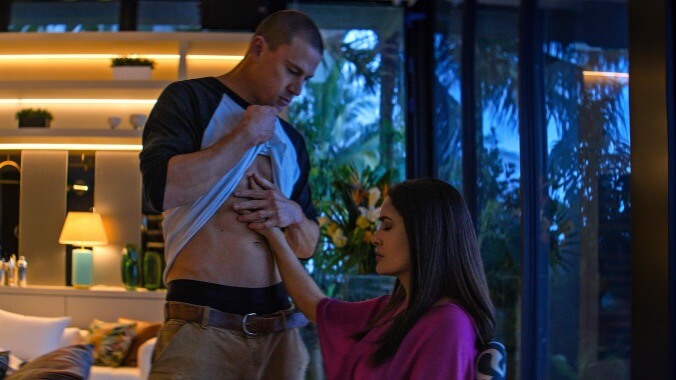In a world of ingenious digital trickery, Channing Tatum may be one of cinema’s best special effects. During the sequence that kicks Magic Mike’s Last Dance into gear—a $6,000 lap dance for overstressed arts patron Max (Salma Hayek Pinault)—Tatum’s physique flows into shapes not physically possible for most humans. Ironically, he’s more of an action figure here than he was in the G.I. Joe movies, with the musculature of He-Man and the liquidity of the T-1000. Both left and right brain are engaged in the viewer, who may be turned on while also intellectually pondering how the hell he just did that one pose.
Of course, after that big number, Tatum’s Mike insists he’s retired and won’t be dancing again. The “tease” in striptease is key—there’s no filmmaker insane or sadistic enough not to have the star finally do his thing for the big climax. In the meantime, numerous additional muscular dudes defy gravity and quicken pulses, but they’re mostly nameless this time around. The third and possibly final Magic Mike film ditches the bromance for a rom-com, but it’s slightly more rom than com, given director Steven Soderbergh’s deadpan sensibility.
This time out, former compadres Kevin Nash, Matt Bomer, Joe Manganiello, and Adam Rodriguez appear solely on a Zoom call; Gabriel Iglesias doesn’t even get that much. Instead, the action moves to London, which allows for new territory and new casting. The opening of the film acknowledges COVID as a reason for Mike’s furniture business failing, but it’s never mentioned again and nobody wears masks. Now a bartender, Mike is hired by Max—first for a dance—and then to come to the U.K. to help put on a show at her theater, which is currently running a Jane Austen-ish play; Max wants to replace it with a show that’ll literally give the audience the same joy she felt when Mike gyrated over her.
Part of the deal is that Max and Mike, who hooked up after the initial dance, must never do so again, ostensibly to keep the memory of their one encounter special. But things, and Max, are complicated. Hayek Pinault, after years of playing perfect objects of desire, makes Max a fully developed woman prone to flights of fancy and temper yet admirably ambitious, well-intentioned, and, indeed, desirable. For Mike, as we saw in Magic Mike XXL, strong and rich benefactors who believe in him are exactly his type, regardless of the drama, and he’s left most on good terms. Max could be the one he won’t leave, if she’ll ever let anything start.
With Mike’s input, the show begins as an upper-crust romance, then segues into burlesque. That’s a decent metaphor for the original Magic Mike, luring in art-house cinephiles who came for Soderbergh’s name, then delivering gyrating abs and buttocks galore. Returning to the director’s chair here after only serving as cinematographer on part two, Soderbergh even dares suggest that a burlesque house is, in fact, its own kind of art house. Stylistically, he’s less obviously “Soderbergh-ish” than when he ws merely a DP for XXL director Gregory Jacobs—there’s intro and outro narration and a hilarious “intermission,” although he needlessly edits footage we’ve already seen into the climax so we understand that dance is a metaphor for life.
Since more moviegoers are likely coming to a Magic Mike movie for the moves than the plot, let it be stated the moves are outstanding, even if the movers remain mostly blank slates. However, the core story, again by franchise regular Reid Carolin, remains more focused and with fewer vignettes, as Mike navigates a household that also includes Max’s sarcastic butler Victor (a deliciously wry Ayub Khan Din) and precocious daughter Zadie (impressive newcomer Jemilia George). Not to spoil anything that wouldn’t be obvious, but the ending this time is more than just the big show, offering closure to the narrative beyond the dancing. So, by the end, if you weren’t already cheering at least a little bit on the inside, you might need that $6,000 dance from the beginning of the film more than Max does.
(Magic Mike’s Last Dance opens in theaters on February 10)









































